Astronomy and Space Science Theme Area
Section outline
-

TNG (Telescopio Nazionale Galileo) Dome, La Palma, Canary Islands
The Astronomy and Space Sciences courses cover a broad range of topics aimed at widening students’ knowledge of the field. They range from advanced extensions of subjects covered at undergraduate level to the introduction of new interdisciplinary sciences. We recommend that students take a mixture of core material, advanced courses (usually 16-20 hours equivalent credit) and more general topics, including computing and data reduction modules, to gain a broad grounding in astronomical methods and modern research areas.Each course is self-contained, although background reading or another SUPA course may be recommended to bring students from various backgrounds up to speed. Students from other theme areas are very welcome to take Astronomy and Space Sciences courses, with particular modules likely to be of interest for Life Sciences and Plasma Physics students, but they should remember that a basic understanding of astronomy and astronomical terms will be assumed by course lecturers.
A typical programme building to the core requirement of 40 hours of Technical courses might include:
· A SUPA technical Astronomy course (these generally constitute 16-20 hours)
· A technical SUPA course in another field or a second Astronomy course
· Non-SUPA courses as appropriate (eg for students changing specialities).
· Summer Schools in Astronomy and Space Physics
Students should note that certain Astronomy courses are only run biennially. Each student must consult their PhD supervisor to contract a suitable programme before registering, and students are encouraged not to over-register. The 40-hour course requirement is taken over the first and second years, although students from all years can take extra subjects for interest.
-
Dr Aurora Sicilia Aguilar, University of Dundee
a.siciliaaguilar@dundee.ac.uk
